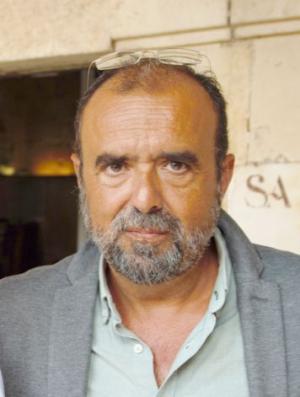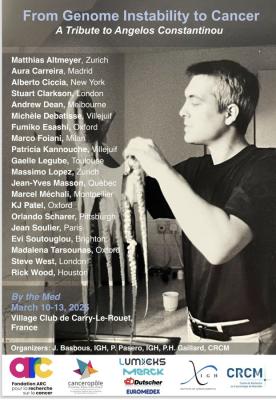Speaker:
Aissam Ikmi (EMBL, Heidelberg,Germany)
Genopolys Amphitheater
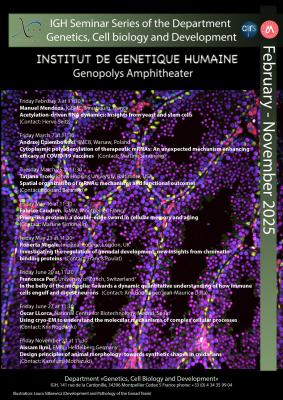
Design principles of animal morphology: towards synthetic shapes in cnidarians
Seminar Series on "Genetics, Cell Biology and Development" 2025
Contact IGH Kazufumi MOCHIZUKI
Speaker:
Oscar LLorca (National Centre for Biotechnology, Madrid, Spain)
Genopolys Amphitheater
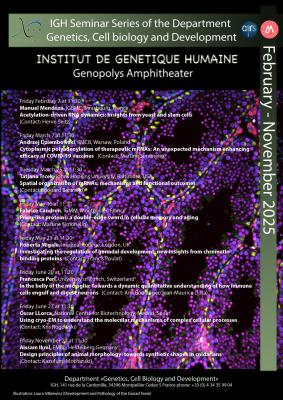
Using cryo-EM to understand the molecular mechanisms of complex cellular processes
Seminar Series on "Genetics, Cell Biology and Development" 2025
Contact IGH Krzysztof ROGOWSKI
Speaker:
Francesca Peri (University of Zurich, Switzerland)
Genopolys Amphitheater
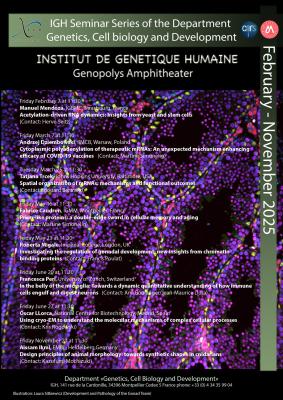
In the belly of the microglia: Towards a dynamic quantitative understanding of how immune cells engulf and digest neurons
Seminar Series on "Genetics, Cell Biology and Development" 2025
Contact IGH Jean-Maurice DURA | Boulanger Ana
Speaker:
Roberta Migale (Imperial College, London, UK)
Genopolys Amphitheater
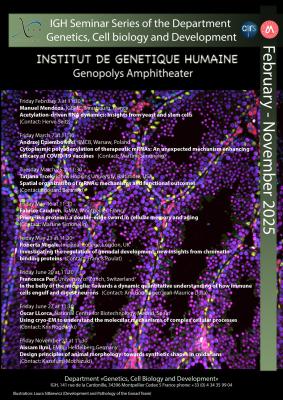
Investigating the regulation of gonadal development: new insights from chromatin binding proteins
Seminar Series on "Genetics, Cell Biology and Development" 2025
Contact IGH Francis POULAT
Speaker:
Fabrice Caudron (IGMM, Montpellier, France)
Genopolys Amphitheater
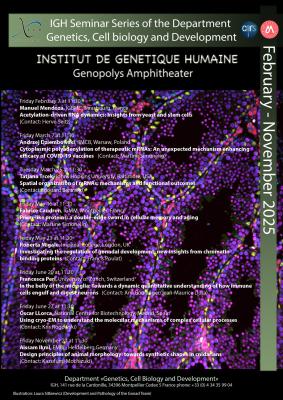
Prion-like proteins: a double-edge sword in cellular memory and aging
Seminar Series on "Genetics, Cell Biology and Development" 2025
Contact IGH Martine SIMONELIG
Speaker:
Tatjana Trcek (Johns Hopkins University, Baltimore, USA)
Genopolys Amphitheater
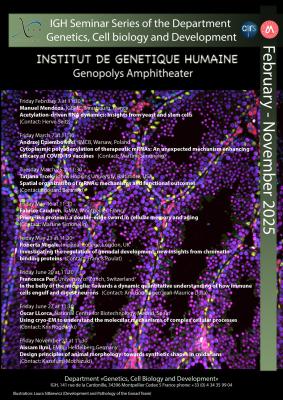
Spatial organization of mRNAs: mechanisms and functional outcomes
Seminar Series on "Genetics, Cell Biology and Development" 2025
Contact IGH Edouard BERTRAND
Speaker:
Andrzej Dziembowski (IIMCB, Warsaw, Poland)
Genopolys Amphitheater
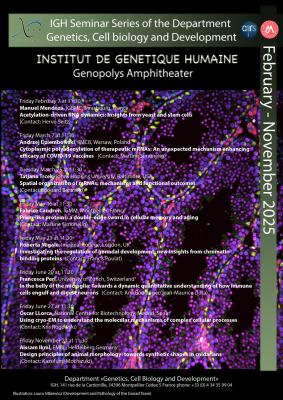
Cytoplasmic polyadenylation of therapeutic mRNAs: An unexpected mechanism enhancing efficacy of COVID-19 vaccines
Seminar Series on "Genetics, Cell Biology and Development" 2025
Contact IGH Martine SIMONELIG
Speaker:
Manuel Mendoza (IGBMC, Strasbourg, France)
Genopolys Amphitheater
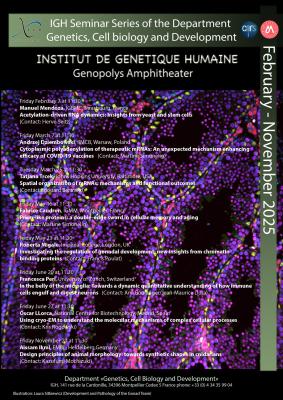
Acetylation-driven RNA dynamics: Insights from yeast and stem cells
Seminar Series on "Genetics, Cell Biology and Development" 2025
Contact IGH Herve SEITZ
Speaker:
Filippo Rijli (Friedrich Miescher Institute, Basel, Switzerland)
Amphitheatre Genopolys
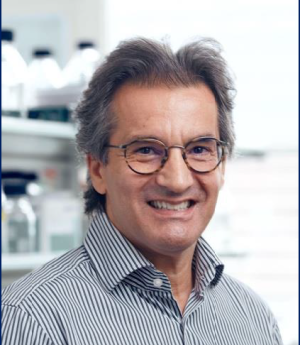
Shaping Faces by 3D Genome RegulationThis project builds on our previous work exploring Polycomb-dependent epigenetic chromatin signatures in mouse cranial neural crest cells (Minoux et al., Science 2017). During cell migration, key transcription factor genes remain transcriptionally repressed but poised for activation. Specific cues trigger a switch from a poised to an active chromatin state in postmigratory cells, enabling position-specific transcriptional programs that drive facial structure development. We recently mapped promoter-promoter...
Contact IGH Giacomo CAVALLI
Chromatin and cell biology
Speaker:
Alberto Pendas (Instituto de Biologia Molecular y Cellular del Cancer, Salamanca, ES)
Genopolys Amphitheater
Coordination of Synapsis and Crossover Designation and Maturation in Mouse MeiosisIn this presentation, I will discuss our recent discovery of a novel function of the synaptonemal complex protein SIX6OS1, which redefines the traditional understanding of the relationship between synapsis and meiotic recombination in mammals. Classically, synapsis and crossing over (CO) are viewed as interdependent processes that ensure genetic diversity and accurate chromosome segregation during gametogenesis. However, the molecular mechanisms linking these processes remain elusive. In humans,...
Contact IGH Bernard DE MASSY
Meiosis and recombination

